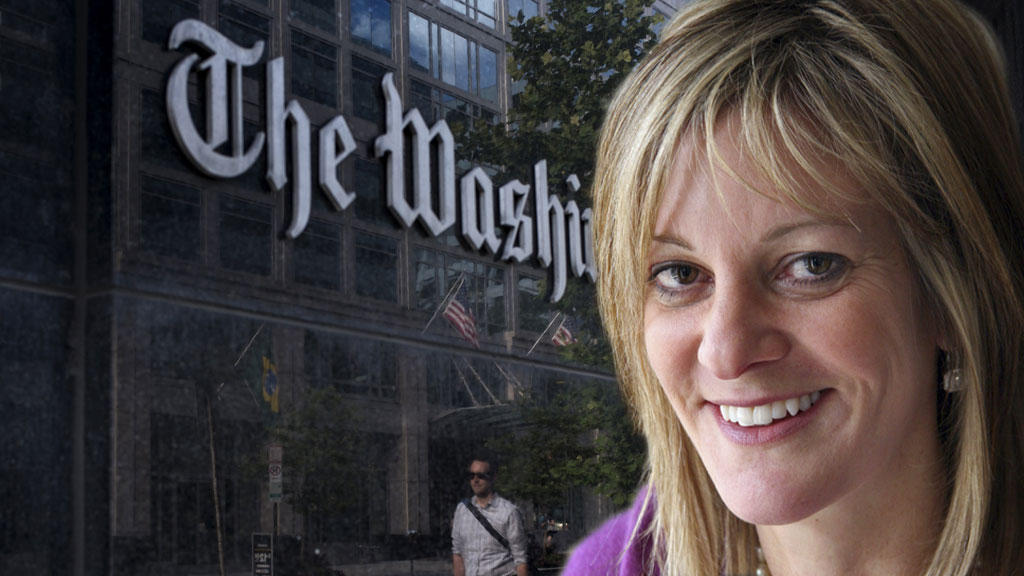Katherine Weymouth: the woman behind the Post
 Matt Frei
Europe Editor and Presenter
Matt Frei
Europe Editor and Presenter
With news that Jeff Bezos, founder of internet giant Amazon, is buying Washington Post, Matt Frei looks at the role of the newspaper’s publisher, Katharine Weymouth.

Until a few days ago Ms Weymouth had had probably her best month since continuing in the family business and taking over the publishing of the Washington Post, one of America’s iconic newspapers.
The single mother of three, who lives in a large but dishevelled suburban house with her young children and a small zoo of household animals, had embarrassed her big rival the New York Times by publishing the NSA Edward Snowden bombshells.
She herself was the subject of a glowing two page spread in the New York Times on Sunday.
Despite the papers’ historic enmity, the Times – as it is known here – praised the Post’s young publisher for deserving the mantle created by her legendary grand mother.
Watergate scandal
Kay Graham was the Elisabeth First of the American newspaper world. She was print royalty. Her family had owned the Washington Post for decades.
But she took the paper to new heights with the uncovering of the Watergate scandal that toppled a president and inspired a generation of journalists.
Ms Graham went against the Washington establishment while being a pillar of it at the same time. In her Georgetown mansion she hosted presidents, prime ministers and Hollywood stars.
The Graham family embodied a curious Washington mixture of old money, political clout and civic responsibility.
In its heyday the Post dominated the lucrative local advertising market and its paper made a mint. The article on Sunday reminded readers of that golden era.
Read more: Why has Amazon CEO bought the Washington Post?
Haemorrhaging revenue
On Monday it was announced that the Post been sold for a mere $250m to Mr Bezos of Amazon.
It came as a genuine shock. Last night the sultry air of a Georgetown summer, when the city is empty and all movement slows to a crawl, was abuzz with a mixture of remorse, speculation, worry and the inevitable glee.
The reporter who wrote the New York Times profile of Ms Weymouth was clearly not from the paper’s investigative unit. But the writing had been on the wall for years.
The Post, like every other newspaper in the country, was haemorrhaging advertising revenue in a 7 per cent year on-year decline.
But unlike most other newspapers, it refused to gut its newsroom staff to the barest bone. It still has dozens of foreign bureaux and a stable of renowned columnists.
This meant spending money it couldn’t make. You could see the daily struggle on its pages between a renowned paper with global ambitions and a local paper clinging on to local advertising.
‘Faded baseball stars’
This trapeze act didn’t work and one can only guess that it was the old family friend and Post investor billionaire Warren Buffett who advised the Grahams to sell before it was too late.
Just a week earlier, the Boston Globe, which had been bought by the New York Times company for $1.1bn in 1993 was sold for a more $70m to John Henry, the owner of the Boston Red Sox.
Newspapers have become like faded baseball stars, traded for the delight and distraction of the super rich.
The decision to sell a newspaper that had been in the Graham family for eight decades must have been really painful.
Read more: Amazon founder Bezos buys Washington Post
Existential riddle
But in the end Mr Bezos, with his Amazon genius for tailoring the sale of everything to the picky online consumer, may stand the best chance of solving the existential riddle of the newspaper world: how do you make money out of online sales at a time when most of us still assume that online information comes free?
If anyone can do it, it is Mr Bezos. He embodies the transformation in the investor landscape.
The $250m he spent on the Post represents less than one percent of his fortune.
Other billionaires who have bought newspapers like Lego pieces have enough cash to plough it back into the editorial side. My friends on the Post hope that Mr Bezos will do the same.
Race to extinction?
The statistics show that slashing staff and content only amount to a race to the bottom and extinction. The future of any quality newspaper lies in quality.
What the new generation of owners needs to figure out is a delivery system that pays. Ms Weymouth will have made some money this week and she will continue to be involved with the publication of the newspaper.
Her old rival, the New York Times, will be watching closely and nervously how the Post fares under Mr Bezos.
Another person who will be loosing sleep over this is Rupert Murdoch. The man who once broke the print unions and shook up the old newspaper world is beginning to look like a dinosaur amongst media moguls.